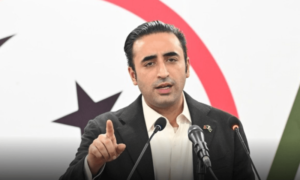ISLAMABAD:
The Supreme Court has sought detailed report regarding climate change challenges faced by the country and the initiatives taken the government — both at the federal and provincial levels — to mitigate them.
“Notice shall also be issued to the Attorney General for Pakistan, as well as, to the advocate generals of all provinces for the aforesaid date,” says the order issued by a three-judge bench led by Justice Syed Mansoor Ali Shah.
The bench was hearing a petition filed by Public Interest Law Association of Pakistan through Faisal Hussain Naqvi against non-functioning of the Pakistan Climate Change Authority.
The order read: “The officials will submit a detailed report regarding climate change challenges faced by them and the initiatives taken by their respective governments on March 21.”
The bench said it would also seek the opinion of independent experts, including Hammad Naqi Khan of the World Wildlife Fund (WWF), Abid Qaiyum Suleri of the Sustainable Development Policy Institute.
The order noted that according to the Global Climate Risk Index, Pakistan is currently the fifth most climate-vulnerable country in the world. At the same time, Pakistan also faces some of the highest disaster risk levels in the world, ranking 23th out of 194 countries as per the 2024 Inform Risk Index.
“This risk is driven particularly by the nation’s exposure to flooding, earthquakes, tropical cyclones and their associated hazards. It is these alarming statistics which underscore the need to address climate change and mitigate its effect on people and their livelihoods.
While developing countries like Pakistan may not be the primary contributors to climate change, acknowledging and confronting its fallout is indispensable, especially for combatting the high risks posed by climate change.
Read also: ‘Climate change exacerbates existing vulnerabilities’
“As Pakistan and other nations come to terms with the impacts of climate change, they will confront questions of adaptation, a process of adjustment to actual or expected climate and its effects.
“As a country which has a very low technical and financial capacity to adapt to its adverse impacts, the critical importance of adaptation and its role in reducing vulnerability, promoting equity and safeguarding economic and social stability, particularly for vulnerable populations and the marginalized communities must be underscored.
“This not only aligns with Pakistan’s international commitments such as the Paris Agreement but also contributes to the advancement of the United Nations’ Sustainable Development Goals.
“The devastation caused by the catastrophic floods in 2022 is distressing proof of the same which caused a total damage of Rs3.2 trillion ($14.9 billion), a total loss at Rs3.3 trillion ($15.2 billion) and total needs for recovery and reconstruction at Rs3.5 trillion ($16.3 million).
“Against these alarming figures and background, the need for climate finance as new and additional and sustained financial resources with a transparent mechanism, that meets the needs to developing and vulnerable countries like Pakistan, with the speed and scale is direly needed.”
Pakistan’s commitment to equitable and effective global climate governance is also evident in its multifaceted approach at COP-28. The nation not only emphasized the financial aspects, calling for simplified access procedures to climate finance and expressing a preference for grant-based financing, but also actively reached a historic agreement on the operationalisation of the loss and damage fund and funding arrangements.
The agreement, as agreed upon by all parties at COP28 urges developed nations to lead in financial contributions to make up for the irreversible climate change induced damages they have contributed to. This holistic commitment underscores Pakistan’s leadership in navigating the complexities of climate change and its dedication to fostering a fair and transparent global response to the urgent challenges posed by a changing climate. Similarly, the implications of this fund’s operationalization and dynamics can be profound for climate vulnerable countries like Pakistan which suffer from extreme weather events.
“As Pakistan moves towards adaptation, it must be supported by greater accessibility of and access to finance. According to the United Nations Convention on Climate Change (“UNFCCC”) Standing Committee on Finance, “Climate finance aims at reducing emissions and enhancing sinks of greenhouse gases and aims at reducing vulnerability of, and maintaining and increasing the resilience of, human and ecological systems to negative climate change impacts.”
Read: ‘Woman more impacted by climate-related disasters’
The primary goal of climate finance is to facilitate the transition to a low-carbon and climate-resilient global economy. In the context of Pakistan, the economic cost of climate change is substantial and affects all sectors, including agriculture, infrastructure, trade and tourism.
Developing countries like Pakistan struggle with high levels of debt, which potentially hinder their ability to invest in climate mitigation and adaptation measures.
“Therefore, access to existing climate funds needs to be simplified and the issue of debt needs to be looked upon. Another way to curb this issue is the usage of loss and damage fund which could play a pivotal role in building resilience, supporting adaptation efforts, and aiding in the recovery from climate-induced losses.
Loss and damage arising from the adverse effects of climate change can include those related to extreme weather events but also slow onset events, such as sea level rise, increasing temperatures, ocean acidification, glacial retreat and related impacts, salinization, land and forest degradation, loss of biodiversity and desertification.
Article 8 of the Paris Agreement enshrines the importance of averting, minimizing and addressing loss and damage and the role of sustainable development in reducing the risk of loss and damage”
“The establishment of a loss and damage fund for highly climate-vulnerable countries like Pakistan would be a vital step towards realizing climate justice. Acknowledging that developing countries like Pakistan often contribute the least to climate change but suffer the most severe consequences, the fund underscores the moral responsibility of historically high-emitting countries.
Moreover, by facilitating the implementation of climate-resilient infrastructure and community-based adaptation strategies, the fund could empower the marginalized communities to better cope with the impacts of climate change, fostering international cooperation and financial commitments essential for a sustainable and just future.










